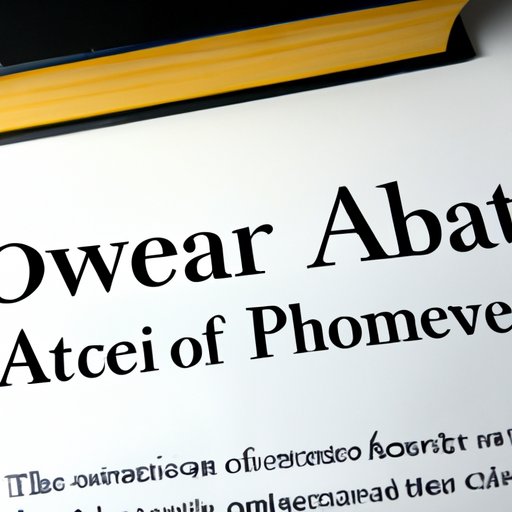Understanding Power of Attorney (POA): A Comprehensive Guide
As much as we desire to live life to the fullest, several risk factors exist, affecting our ability to make decisions and carry out everyday activities. Power of attorney (POA) is a legal document that can help you plan ahead to ensure your welfare in such situations. This article offers a comprehensive guide to understanding POA and how it can benefit you.
Understanding POA: A Guide to This Essential Legal Document
A power of attorney is a legal document granting a trusted individual(s) (agent) the legal authority to act on your behalf if you are unable to do so concerning important decisions. These decisions range from managing business transactions to healthcare decisions.
There are different types of POAs. The first is the general POA, which grants the agent the authority to act on your behalf concerning all financial and legal decisions. The second is the limited POA, which gives the agent the power to act only on specific transactions. The third is the durable POA, which remains valid even if you become incapacitated. A springing POA becomes effective only when a specific event has occurred, usually incapacitation.
To legally grant a POA, individuals must be mentally competent and of age (18 years and above). You must also specify the POA type, the agent(s), and the duration of its validity (if applicable). The document must also be signed in front of a notary public, who verifies the signatures and the document’s authenticity.
When creating a POA, it’s essential to consider the situations the agent(s) may face, ensure they have the necessary resources and business knowledge to make essential decisions.
The Importance of a Power of Attorney: What You Need to Know
There are tons of misconceptions about POA. Most people believe that it’s only necessary for the elderly or those with serious health issues; however, it’s never too early to prepare a POA. A POA ensures that your wishes are carried out when you are not able to communicate or make decisions. It is your chance to decide who makes your choices, how they are made, and when they are made.
POA is important because it helps avoid some legal challenges that arise from conservatorship or the transfer of assets to heirs. It can also serve as a protective legal tool against fraud or financial exploitation.
Here’s a case example of how POA helped a family:
A young family with a three-year-old son was involved in a car accident, and the parents could not make any medical decisions. They had appointed a family friend as their agent on their POA. The friend made medical decisions on their behalf, which helped the family relax and focus on their son’s recovery.
Demystifying POA: A Beginner’s Guide
What happens if there’s no POA in place? If no POA is in place, the court will appoint a guardian or conservator to make decisions for you. The process can be expensive, complicated, and limit the options available for your care.
Who can be a POA holder? Anyone over the age of 18 and has no felony convictions can become a POA holder.
How can a POA be revoked? A POA can be revoked at any time with a revocation letter. It’s also essential to ensure all institutions with your POA are notified of the revocation.
Creating a POA can be overwhelming, but you can enlist the services of a professional. Several legal service providers can draft POAs for you at affordable prices.
Navigating the World of POA: Tips and Insights
Before drafting a POA, consider the following:
- Choosing an agent: Your agent(s) should be trustworthy, capable, and understand your needs.
- Communicating with your agent: Don’t hesitate to discuss your needs, and ensure your agent understands how you want things done.
- Updating your POA: Laws change, personal situations change, and it is essential to review your POA regularly.
Why POA Matters: Exploring the Benefits of a Power of Attorney
There are several tangible advantages of having a POA. It helps protect your assets, minimize legal disputes, avoid conservatorship, and allows you to choose who makes your decisions in your absence. Not having a POA can cause disputes, court battles, and expensive legal challenges.
From Bank Accounts to Healthcare Decisions: How POA Can Help You Plan for the Future
A POA can cover several areas like finances, healthcare, and business. For healthcare decisions, a medical POA allows the agent to make healthcare decisions on your behalf. A financial POA allows the agent to manage your finances, properties, and assets. A business POA allows the agent to transact on behalf of your business.
Here’s a case example of how a POA helped an individual:
A business owner was in a coma for six months following a car accident, and the business operations had been halted. The business owner had appointed his spouse as the business POA holder, who could make decisions on behalf of the company. The business continued operating smoothly, ensuring that family employees received their pay regularly.
Conclusion
Power of attorney is an essential legal document that ensures your wishes are carried out when you cannot do so yourself. This article has explored the benefits of POA, the different types of POAs, how to create a POA and why it matters, among other topics. Take control of your future and safeguard your wellbeing by creating a POA today.
